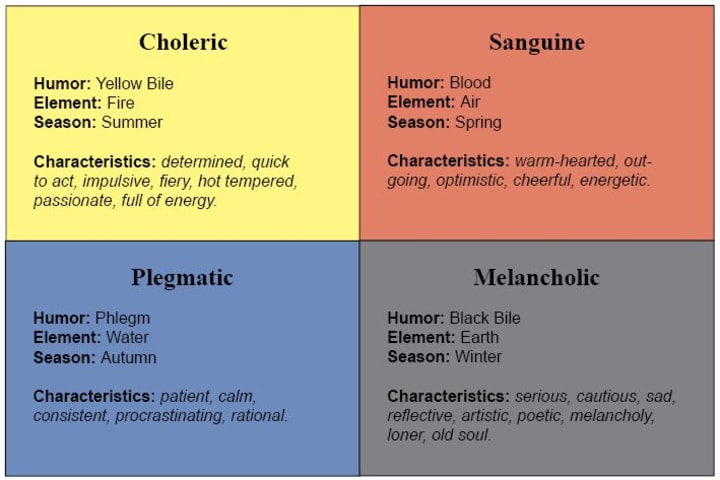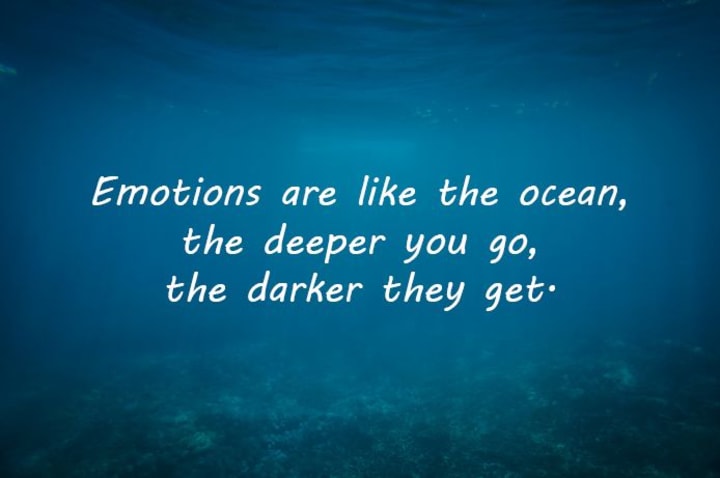When depression isn’t depression
Finding happiness when you’re wired for sadness.

I have a real issue with depression being termed a mental illness… wait, let me finish… because sometimes depression isn’t depression. Sometimes it’s a normal and natural state of being and by calling this depression we are labelling a whole group of people as mentally ill when in fact they’re perfectly well.
The problem is that we are using the word, depression, to cover a vast range of feelings, emotions and moods. This one word is used to describe everything, from feelings stirred by a sad song to feelings that have pushed someone to stand on the edge of the cliff ready to step off. By using this one word so loosely we are blurring the lines between healthy emotional reactions and unhealthy, self-destructive thoughts and causing an awful lot of confusion in the process. I see the terms depression, mental health and mental illness used interchangeably as if they’re synonymous when they are not.
It might seem trivial or that I am getting overly anal about semantics, but I see the consequences of this all the time: people who feel shame because they believe their preference for being alone is a sign of mental illness, those who worry that even though they have a great life they still seem to feel sad and gloomy all the time, those who think and feel so deeply that they feel alienated from the people around them, those who are afraid to say that they think sad songs, or dark haunting landscapes are beautiful. None of these people suffer from mental illness, they are all perfectly normal. They’re just wired differently and it’s these people I wish to reach out to, to reassure them that there’s nothing wrong with them.
I’m not a psychologist or counsellor so perhaps I’m not qualified to comment, but as depressive person who often gets depressed and has suffered from depression I can comment from my experience, extensive reading and my observations of human nature. For the purposes of this article, I will talk about depression, as perceived by the general public in three categories.
Severe or clinical depression
This is severe, chronic, unshakable depression and it is a mental illness. It is debilitating and can interfere with the person’s ability to lead a normal life. It can be the result of a traumatic experience, outside stressors such a work or relationship problems, being bullied, or it may have no apparent trigger and may be due to hormonal or chemical imbalances. It is more than simply low mood or feeling down. It involves a self-harming mind-set, not necessarily through physical self-harm, but through self-loathing, self-defeating, self-depreciating thoughts. It may often also be a lifelong affliction in the same way that certain physical conditions/illnesses require lifelong treatment though may have periods of remission where symptoms are reduced. The video below produced by The Mighty and Wentworth Miller, illustrates this perfectly.
If you are struggling with this kind of depression then I strongly encourage you to reach out and seek help in whatever form you feel most comfortable with. You are not alone and there are people out there who have been where you are and want to help you.
Mild depression
This is the ‘traditional’ low mood depression associated with a triggering life event such as the death of a loved one, relationship break-up, life stresses etc. It may have an element of self-defeating thinking to it, but it doesn’t solely revolve around these thoughts. It is temporary and may pass on its own through the use of self-care techniques or it may benefit from professional help. In terms of mental illness, it’s more like coming down with a seasonal virus than being diagnosed with a chronic condition/illness. This depression is more a symptom than a true illness. It is the effect of a very real cause in a cause and effect equation.
While it is important to address the symptoms of all forms of depression and support those in distress, we also must not lose sight of the fact that depression very rarely occurs in a vacuum and if we can eliminate the bullies, intolerance, work stresses, inequality and injustices we will be doing more to promote future mental health wellness than Band-Aid counselling and medication.
Depression that isn’t depression at all
This perceived depression isn’t depression at all. It is normal and natural in the way that there are variations in skin colour, hair colour or eye colour and is not a mental illness. Although the guilt and shame a person can feel for being this way. if they don’t know that it is normal, can lead to mild depression, even severe depression.
This ‘depression’ describes a person’s outlook, their persona, their disposition, the way they experience life. It describes the kind of person who seems perpetually gloomy and prone to random low moods and tearfully fragile states which seem to come from nowhere or they seem to absorb the emotions of others around them. They find busy social situations or noisy crowded venues exhausting and feel perplexed as to why they feel so ‘down’ after enjoying themselves after a night out with friends. A sad song brings them to tears every time they listen to it and when their friends ask why they insist on listening to it if it makes them sad, they answer, because it’s so beautiful. They feel sad at weddings and holidays like New Year’s. They struggle to be cheerful and bright, even though they are satisfied and content – essentially happy – with their lives. They worry a lot and their friends say they always find fault in things, that they complain too much and are simply just so ‘negative’. They are drawn to sad paintings, tragic love stories, rain, darkness, abandoned landscapes, the sentimental and the nostalgic. They feel deeply, think deeply and experience life deeply.
So, if it isn’t depression then what is it?
In short, it’s a natural trait, much like extraversion and introversion. There was a time when introversion was seen as a very real mental illness, evidence of an unhealthy and unbalanced mind, but we now understand it is merely on one end of a normal and healthy spectrum of behaviour. And just as there are variations in personality, there are also variations in temperament, and the temperament that is most often mistaken for depression is melancholy.
Melancholy is one of the four humours or temperaments model which dates back to the ancient Greeks and is believed to have been developed by Hippocrates. The four humours model was based on the main fluids of the body recognised at the time and an excess of any one of these fluids was to believed to determine a person’s temperament. These temperaments also matched the seasons and were linked with the four elements.

While this model is thousands of years old, and overlooked now if favour of Myers Briggs personality typing I think it is still relevant today as personality alone does not fully describe a person’s innate nature. You can have four people who all have similar extraverted personalities but have different temperaments: one happy, go-lucky, cheerful (sanguine), another serious, rarely smiles, always a little sad (melancholic), one slow to act, calm, sometimes apathetic (phlegmatic) and one who’s abrasive, cranky prone to angry outbursts (choleric). Essentially people have different operating systems, are simply wired differently. Some people are wired for happiness as their main setting, others are wired for sadness. This doesn’t make them inferior or abnormal in any way.
The gift of melancholy
I am a melancholy person and I get quite defensive when someone calls me depressed when I’m actually in melancholy mode. I’m very protective of my melancholy – I see it as a gift, the source of my creativity. For this reason I refused for many years to try anti-depressants for my episodes of real depression – I was afraid it would be like a chemical lobotomy and rob me of the one thing I valued most about myself.
However, in my early thirties I finally relented, when a second best friend passed away tragically and I was also studying at the time and in a troubled relationship and grief spiralled into thoughts that I was cursed, that anyone who understood me was doomed to die and I could't cope with trying to banish these thoughts and carry on my daily routine as normal.
The interesting thing is that though the meds helped with the depression they did not remove my tendancy to melancholy. They also did not turn me into an extravert.
So, as one who has experienced depressed moods and depression, I can assure you that melancholy is a completely different experience, though I can understand how it might be mistaken for depression as it is often accompanied with strong emotions. I find my melancholy usually precedes a bout of insight or inspiration which leads to a surge of creativity – usually in the form of writing, but sometimes I also paint. Conversely, if I am struggling with a piece of writing that isn’t working, I’ll actually seek out feelings of melancholy to help me get past whatever is blocking me.
When I’m in a melancholy state, my emotions are heightened and I might be tearful which can cause alarm to those around me, but from my perspective it’s something beautiful. It’s like the world slows down around me, colours become more vivid, smells more intense, sounds purer and I can tune into a higher vibration and feel connected to a cosmic consciousness. It’s like those movie scenes where the superhero is able to slow time and everything around him slows down to the point that he can see the individual wing beats of a hummingbird. I believe the melancholy state of the melancholy person is actually a natural state of meditation. While other temperaments find the practice of focussed meditation helpful for coping with stress, I think that the melancholy person will automatically slip into a melancholy state when they are in need of destressing. So, instead of being a cause for concern, the melancholy state is in fact a natural coping mechanism.
Though I have absolutely no evidence and I’m not sure the research even exists, I suspect that the melancholy mind is uniquely adapted to accessing the theta brainwave state. When the brain is in this state a person experiences creative insight, imagination, intuitive problem-solving, dream-like visualisations and even spiritual connection. However, for most people this state is usually only accessed in that short transition phase between waking and sleep or through disciplined meditation practice. I suspect the melancholy person is able to access this state instinctively, without much effort. There is anecdotal evidence that creative types are prone to depression and melancholy and it may be that the reverse of this is the real truth, that those with melancholy natures are more readily able to access the creative state.
Melancholy people are natural deep beings, in that they feel deeply, think deeply and experience life deeply. This naturally makes them more accustomed to, and less afraid of, the darker emotions and experiences that are taboo or uncomfortable to others. It’s like emotional experience are layers in the ocean – the deeper you go, the darker it gets. The melancholy being is simply better suited and more comfortable with living in the deep. To us, the surface layers are crowded, noisy, polluted, too busy, too warm, more vulnerable to storms and easy prey to birds and other creatures that frequent the upper regions. Down in the depths it is cooler, calmer, more spacious, things move at a slower pace and we are more appreciative of the occasional warm updrafts from thermal vents.

Unlike others who require scuba gear and need to surface slowly to decompress when they visit the depths, we are like the free diver, able to dive down into the darkness on a single breath, pluck a pearl from the inky depths before returning to the surface unscathed. We can experience these emotions from a distance, are able to objectively step aside and instead of being controlled or overwhelmed by them, we can instead use them to explore our inner world, to understand what our subconscious might be trying to tell us, just as one seeking enlightenment might look to a guru for guidance. We see our melancholy emotions as messengers. So, while our emotional state may seem concerning to others, from our point of view, it is the well from which inspiration springs and the only way to tap into it is to embrace the emotion.
Not only do we have this great depth of experience and emotional range, but I believe there are also very real advantages to being melancholy.
We accept that perfection is unrealistic and unattainable, which means we’re able to make the best out of a bad situation. Often we’ll end up creating something more superior than those who waste time and energy trying to restore things to the way they were.
Yes, as a melancholy person I worry about the things that can go wrong. Because of this, I plan meticulously, consider every contingency, set up back-up plans and make sure I’m fully prepared before undertaking a task. The end result: most of those huge stressful situations like organising an event or moving house run with clockwork precision without incident. It’s ironic for one who’s apparently so ‘negative’, people often remark how lucky I am, that things always seem to go my way. That’s because I make sure they do.
We melancholics see life as it really is, we’re realists rather than pessimists. We find happiness in the small things, the simple pleasures in life and while we may not feel ‘happy’ in our lives in the way people expect a happy life should be, we are often content with who we are and where we are in life and the world. I would argue that this actually makes us generally happier in life than our non-melancholy counterparts because our level of happiness is more achievable.
In closing
I believe the fact that we have different personality and temperament types is an evolutionary adaptation. These traits are not exclusive to humans, they occur in the animal kingdom. Every pet parent will immediately tell you that their fur babies have individual unique personalities. In her work with high sensitivity, Dr Elaine Aron proposes that the fact that individuals with more highly-sensitive nervous systems can be found in any population of animal, bird, reptile or fish indicates that this is an adaptation that evolved to equip some members of the group to tune in to subtleties in the environment and detect predators and other dangers faster than others. Their trait makes them the natural lookouts and protectors of the herd.
I believe different personalities and temperaments evolved for the same reason, to bring balance to a population. We are all different in order to temper each other and bring our own unique talents to the table. We need the phlegmatics’ and melancholics’ caution and realism to temper the cholerics’ and sanguines’ enthusiasm and passion and vice versa.
Melancholy is simply part of the human condition and it’s time we stop seeing it as mental illness and celebrate it as a normal and precious state of being.
One last point… in music, pieces that have a happier, brighter more cheerful sound are generally written in a major key. Music that has a darker, sadder, more melancholy sound is usually written in a minor key. Whether you prefer one over the other is entirely a matter of taste.
So, whether you experience life as a major key or a minor key, it's still music.
About the Creator
Skye Bothma
Skye is a freelance editor and writer living in rural New Zealand, where she writes about life, love and what it is to be human. She is also the author of one novel and working on her next book. Visit her website at www.skyebothma.nz






Comments
There are no comments for this story
Be the first to respond and start the conversation.